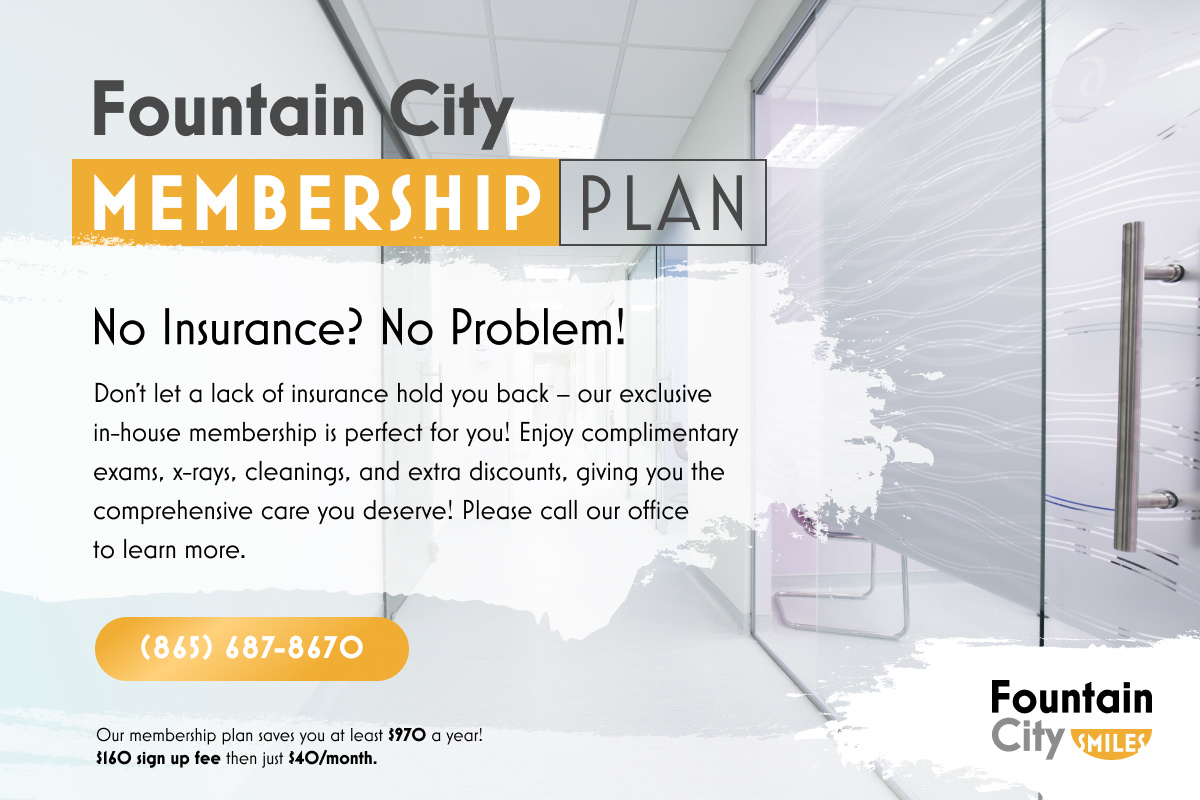Relieve Your Tooth Pain at Fountain City Smiles
Emergency toothaches can occur unexpectedly, bringing about severe pain and anxiety. In times of dental distress, few conditions are as urgent and uncomfortable as a toothache. Whether mild or severe, toothaches can interrupt daily activities and require immediate attention.
If you’re seeking treatment for toothaches, contact our Knoxville, TN, dental office by calling (865) 687-8670. We’re here to help alleviate your pain!
Causes of Emergency Toothaches
There are many causes of tooth pain, including:
- Dental Decay and Cavities: Tooth decay, typically resulting from plaque buildup and inadequate oral hygiene, can lead to cavities that expose nerves, causing pain.
- Gum Disease: Advanced gum disease (periodontitis) can lead to gum recession, exposing sensitive tooth roots.
- Dental Trauma: Accidents or injuries that harm teeth, gums, or jawbones can cause severe toothaches.
- Abscessed Tooth: A bacterial infection can result in an abscessed tooth, characterized by swelling, pus formation, and intense pain.
Toothache Symptoms
Experiencing a toothache can manifest in various symptoms, each indicating a potential underlying dental issue. Be mindful of the following signs:
- Sharp or Throbbing Pain: Persistent pain in or around the tooth, often worsening with pressure or temperature changes.
- Swelling and Sensitivity: Swollen gums, sensitivity to hot or cold foods/drinks, and discomfort when chewing.
- Fever and Swollen Lymph Nodes: In cases of infection, systemic symptoms like fever and swollen lymph nodes may occur.
Steps to Achieve Toothache Relief
Rinse Your Mouth with Warm Water
One of the simplest and most effective initial steps for addressing a toothache is rinsing your mouth with warm water. This technique aids in cleaning the mouth by flushing out food particles, bacteria, and other debris that may be contributing to the discomfort.
The warm water is particularly soothing for irritated gums and offers temporary relief. Make it a habit to gently and thoroughly rinse your mouth at the first sign of dental pain.
Use Dental Floss
Incorporating dental floss into your routine can significantly aid in alleviating tooth pain. Often, food particles and debris become lodged between teeth, leading to irritation and discomfort.
By carefully flossing, you can remove these particles, reducing the chances of inflammation and pain. Make flossing a part of your daily oral hygiene regimen to maintain dental health and prevent future toothaches.
Over-the-Counter Pain Relievers
Over-the-counter (OTC) pain relievers are a convenient and effective option for managing toothache pain.
- NSAIDs: Nonsteroidal anti-inflammatory drugs (NSAIDs), such as ibuprofen and naproxen, are excellent for addressing dental pain by targeting inflammation. They work by decreasing the production of inflammatory substances in the body, thereby reducing pain and swelling. The American Dental Association recommends NSAIDs as the primary treatment for dental pain in adults and adolescents.
- Acetaminophen: Acetaminophen is another reliable choice for temporary pain relief, especially for children or those who can’t take NSAIDs. Unlike NSAIDs, acetaminophen lacks anti-inflammatory properties but is effective at relieving pain. It’s often recommended due to its gentle nature on the stomach and its suitability for a wide range of individuals.
Topical Anesthetics
Topical anesthetics are an effective method for providing localized pain relief directly to the affected area. Products like medicated gels and drops containing benzocaine can successfully numb the painful spot in your mouth, offering temporary relief from dental pain.
These anesthetics work by blocking nerve signals, helping to alleviate the discomfort associated with toothaches. Benzocaine gels and toothache drops are widely available and easy to use.
Cold Compress and Elevation
Applying a cold compress to the outside of your cheek can effectively reduce swelling and provide temporary pain relief. The cold temperature helps constrict blood vessels, which minimizes pain and inflammation. This method is especially beneficial if the tooth is chipped or knocked loose. Use the compress for 15 to 20 minutes at a time, ensuring it’s wrapped in a clean towel to protect your skin.
Elevating your head while sleeping can help reduce toothache pain by preventing blood from pooling in the affected area. This technique can alleviate some of the pressure and discomfort associated with a toothache, allowing for more restful sleep. Use an extra pillow to keep your head elevated and reduce the likelihood of waking up with intense pain.
When to See a Dentist for a Toothache
Recognizing the right time to seek professional dental care for a toothache is essential to prevent complications and effectively alleviate pain. While some minor toothaches might resolve on their own, specific symptoms and situations necessitate immediate attention from a dentist.
Persistent Tooth Pain
If your toothache persists for more than one to two days despite using over-the-counter pain medications and home remedies, it’s crucial to visit our Knoxville, TN, dentist. Ongoing, severe tooth pain may signal an underlying issue that requires a professional diagnosis and treatment.
Severe Pain
Intense, throbbing pain that disrupts your daily activities or worsens over time might indicate a more serious dental problem, such as an abscess or deep decay. An immediate dental evaluation is necessary to alleviate severe pain and prevent further complications.
Swelling or Pus
If you notice swelling around your tooth, gums, or face, accompanied by pus discharge, it indicates an infection that needs immediate dental attention. Ignoring these signs can result in the infection spreading and potentially leading to systemic health complications.
Fever and Swollen Lymph Nodes
Experiencing systemic symptoms such as fever, chills, and swollen lymph nodes (particularly under the jaw or in the neck) may suggest that an infection from a tooth abscess is spreading. It is crucial to seek urgent dental care to prevent further health issues.
Sensitivity to Temperature
If you experience heightened sensitivity to hot or cold foods and drinks, particularly if it persists after the source is removed, it might indicate nerve involvement or tooth decay. Our emergency dentist can assess the situation and suggest the appropriate treatment.
Pain with Chewing or Pressure
Experiencing pain that intensifies when chewing or applying pressure to the affected tooth may suggest structural damage or an infection within the tooth. A dental examination and treatment are essential to resolve the underlying issue.
Recent Dental Work
If you’ve recently had dental treatments such as fillings, crowns, or root canal therapy and are experiencing ongoing or new pain, it’s important to reach out to your dentist for an assessment. This discomfort could indicate potential complications or the need for further adjustments.
Facial Trauma
Should a toothache be accompanied by facial injuries, such as a broken tooth or trauma to the mouth, it’s imperative to seek immediate dental care. Prompt attention can help prevent further damage and address any underlying dental concerns.
Home Remedies for Temporary Tooth Pain Relief
Home remedies offer a practical and natural way to manage tooth pain until you can see a dentist. Some effective natural remedies for tooth pain include:
- Clove oil, which contains eugenol, acting as a natural anesthetic and antibacterial agent
- Saltwater rinses, which help reduce inflammation and serve as an antiseptic
- Garlic, known for its antimicrobial properties that can combat bacterial infections causing tooth pain
Preventing Future Toothaches
To reduce the risk of toothaches, consider these preventive measures:
- Maintain excellent oral hygiene by brushing and flossing daily, using fluoride toothpaste, and rinsing with antiseptic mouthwash.
- Schedule regular dental check-ups with our Knoxville dentist.
- Opt for a diet low in sugar.
- Consult your dentist about the benefits of sealants and fluoride treatments.
These practices can help remove dental plaque, keep gums healthy, and protect your teeth from tooth decay, ultimately preventing periodontal disease.
Frequently Asked Questions
A toothache is deemed a dental emergency if it persists for more than one to two days and results in severe pain or discomfort. This could indicate an advanced cavity or an infected tooth that necessitates immediate care.
To quickly alleviate toothache discomfort, the most effective immediate step is to rinse your mouth with warm water and carefully use dental floss to dislodge any trapped debris. This can provide swift relief from the pain.
Absolutely, clove oil, saltwater rinses, and garlic can serve as effective home remedies for providing temporary relief from toothaches. These options work by acting as natural disinfectants and helping to reduce inflammation.
See Your Dentist for Severe Toothaches
Emergency toothaches demand timely attention and appropriate care to alleviate pain and prevent complications. To avoid making your pain worse and unnecessary emergency dental procedures, contact our Knoxville dentist at the first signs of a severe toothache.
Call us at (865) 687-8670, and we’ll get you in as quickly as possible. We proudly serve patients in Amherst, Marble City, and West Knoxville.




